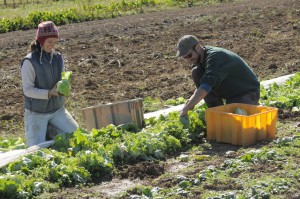Local Farms Bind Us As A Community
Established by the Healthy Hunger Free Kids Act (HHFKA) of 2010, the USDA's Farm to School Program is an exciting way to promote relationships between schools and local producers. Earlier this week, the USDA announced 71 grant projects in 42 states and the District of Columbia for the 2014 Fiscal Year. The Department also just released data showing that in the 2011-12 school year, schools participating in farm to school activities purchased over $350 million in local food. Wowza!
To celebrate the US Department of Agriculture's Farm to School efforts, we're talking to some farmers and moms about what connecting farms to communities means to them.
First up, an interview with Jenn Halpin, Manager of the Dickinson College Farm! The Dickinson Farm is a 50-acre living laboratory that is Certified Organic and Food Alliance Certified. Located just 6 miles from campus, the farm maintains six to eight acres in food production in a given year. The farm is not part of the USDA's program, but is still an inspiring example of the importance of bringing youth and community together around core issues like food...
Hi Jen! What's your role at the farm, and what does the farm produce? 
I am the Farm Director and Manager of the College Farm. I help oversee all production and programmatic functions of the farm, from crop rotations and seed orders to assisting faculty with course work and advising student internships and independent research projects.
What's the farm's connection with the college?
The farm is one of the many College programs that Dickinson has developed to better support sustainability initiatives on campus. Since 2007, the farm has been raising food for the dining hall, supporting campus life initiatives, offering educational and outreach programs to the campus community and supporting academic interests.
What value does the farm add to the Dickinson community? What do students get out of the relationship?
Several things! We provide a direct connection for students, faculty and staff to how food is grown, food sustainability within a seasonal context, appreciation for food production and the ways that a farm can build and inform community.
I think that students gain opportunities to immerse themselves in the team effort needed to grow food. They become fully engaged in the process, from start to finish, rain or shine, and learn what it takes to grow food while sustaining diverse ecological systems.
The farm also provides students with an outlet off-campus that is hands-on. This can be a stress release for many students while also allowing them to connect with one another through meaningful work.
How do you think small, local farms fit into our broader food system? What role do they play?
Local farms are the glue that binds us together as a community of food eaters. They provide us with access to fresh ingredients, seasonal eating options and the opportunity to directly support our local economies. Too often, we overlook the local food options often within a stones' throw of our neighborhoods and the range of food options that they offer (dairy, meat, veg, fruit, etc.)- opting instead for the grocery store chains that are void of fresh options and a sense of connection between consumer and producer of the food that we eat.
How can people support local farming?
This is the simple part- look beyond the grocery store chains and take a deeper look into your local community. Chances are the local options are right under your nose in the form of farmers' markets, farm stands, CSA programs, buying clubs, you name it! For web-based assistance, good resources include:
How can families do to eat more sustainable / local / fresh food?
Farmers' markets are a great way to eat fresh, local and well. Most urban areas have ample farmers' markets to choose from.
**
Also check out: Bringing Hands-On Learning about Local Foods to the Classroom in NY to learn more about the relationship between local farms and schools.
Find out more about MomsRising.org's work around healthy food at: http://www.momsrising.org/page/moms/school-foods-making-the-school-day-h...

The views and opinions expressed in this post are those of the author(s) and do not necessarily reflect those of MomsRising.org.
MomsRising.org strongly encourages our readers to post comments in response to blog posts. We value diversity of opinions and perspectives. Our goals for this space are to be educational, thought-provoking, and respectful. So we actively moderate comments and we reserve the right to edit or remove comments that undermine these goals. Thanks!